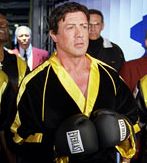 If you’ve seen all the other family movies this season–or even if you haven’t–take your teens or even your grown kids to see “Rocky Balboa.” It may end up being the kind of bonding that goes beyond inspiration to transformation. “Rocky Balboa” starts a little slow compared to most action flicks, but the teens I’ve watched in two screenings are curiously drawn into the story of a father figure-older guy with a way about him that’s endearing. They seem to get his humor, and end up rooting for him for completely different reasons than those of us (like me) who were alive when the original “Rocky” burst onto the scene and became iconic.
If you’ve seen all the other family movies this season–or even if you haven’t–take your teens or even your grown kids to see “Rocky Balboa.” It may end up being the kind of bonding that goes beyond inspiration to transformation. “Rocky Balboa” starts a little slow compared to most action flicks, but the teens I’ve watched in two screenings are curiously drawn into the story of a father figure-older guy with a way about him that’s endearing. They seem to get his humor, and end up rooting for him for completely different reasons than those of us (like me) who were alive when the original “Rocky” burst onto the scene and became iconic.
I didn’t like “Rocky Balboa” as much as I respected it, and was surprised by its impact on younger people. Its message went beyond the typical underdog or one-in-a-million themes of the first “Rocky,” and it also went beyond the sloppy sentiment of a lot of father-son stories as well. “You cast a big shadow” is as real and un-syruppy a line as I’ve heard, and Rocky’s “victim” speech to his son is the kind of thing executives and H.R. departments spend big bucks to communicate to a generation that knows more about how to blame than how to work.
For those who enjoy comparisons and contrasts to the prior movies in the series, there’s plenty in “Rocky Balboa” for you, too. This “Rocky” manages to blend the depth of the first two with the faster movement of the next three. It doesn’t labor along (once it gets going). Pedro Lovell’s “Spider Rico” ends up being a born-again Christian, as surprisingly as “Mick” ended up being Jewish, as we found out at his funeral in “Rocky III.” Talia Shire is credited as “Adrian” even though she’s passed away, which is probably about the only believable way to remember her understated and powerful humanity from “Rocky” and “Rocky II.”
Antonio Carver’s “Mason Dixon” is reminiscent of Mr. T’s “Clubber Lang” from “Rocky III,” but only in the ring. He’s as socially connected and savvy outside of the ring as Lang was reclusive and withdrawn. And the cameo of Mike Tyson is sort of a real-life version of Rocky’s empowering Burt Young’s “Paulie” to make a few bucks off of Balboa’s success.
In the end, “Rocky Balboa” is much like the great fight of the original: It may not rank as an all-time classic, but it goes the distance and has the crowd–including me–rooting it on.
So I’m adding “Rocky Balboa” to my all-time list of Christmas movies with a message–not the ones that preach but ones that go beyond mere inspiration to potentially have a real impact. I’ve written in the past about my all-time favorites, which include the obvious (“It’s A Wonderful Life,” “Miracle on 34th Street”) as well as the less-obvious (“Home Alone II,” Ron Howard’s “The Grinch”), and the stretches (“Die Hard 2,” “Fitzwilly), where significant wrongs are righted at Christmastime.
“Rocky Balboa” belongs, and when we gather to watch it next Christmas, it won’t be me bringing it up–it’ll be my teens, and I’ll be glad they’re listening to its message.

